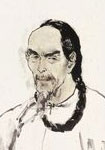“亭亭古玉佩當腰”的意思及全詩出處和翻譯賞析
“亭亭古玉佩當腰”全詩
漠漠郁金香在臂,亭亭古玉佩當腰。
氣寒西北何人劍,聲滿東南幾處簫。
一川星斗爛無數,長天一月墜林梢。
分類:
作者簡介(龔自珍)

龔自珍(1792年8月22日~1841年9月26日)清代思想家、文學家及改良主義的先驅者。27歲中舉人,38歲中進士。曾任內閣中書、宗人府主事和禮部主事等官職。主張革除弊政,抵制外國侵略,曾全力支持林則徐禁除鴉片。48歲辭官南歸,次年暴卒于江蘇丹陽云陽書院。他的詩文主張“更法”、“改圖”,揭露清統治者的腐朽,洋溢著愛國熱情,被柳亞子譽為“三百年來第一流”。著有《定庵文集》,留存文章300余篇,詩詞近800首,今人輯為《龔自珍全集》。著名詩作《己亥雜詩》共315首。
《己亥雜詩》龔自珍 翻譯、賞析和詩意
《己亥雜詩》是清代詩人龔自珍創作的一首詩詞。以下是該詩的中文譯文、詩意和賞析:
秋心如海復如潮,
Autumnal heart is like the sea, rising and falling like tides,
The poet compares his emotions in autumn to the vastness and unpredictability of the sea. Just like the ebb and flow of tides, his feelings fluctuate and surge within him.
惟有秋魂不可招。
Only the autumn soul cannot be summoned.
The poet suggests that despite the changeable nature of his emotions, his autumnal spirit remains steadfast and cannot be easily influenced or controlled.
漠漠郁金香在臂,
Faintly, the fragrance of tulips lingers in the air,
This line evokes the image of the poet sensing the delicate scent of tulips. The ethereal and elusive nature of the fragrance reflects the poet's longing for beauty and tranquility.
亭亭古玉佩當腰。
Graceful and exquisite, an ancient jade pendant adorns the waist.
Here, the poet describes the elegance and preciousness of an ancient jade pendant worn around the waist. It symbolizes the poet's appreciation for refined and timeless beauty.
氣寒西北何人劍,
In the cold air, who wields a sword in the northwest?
This line portrays a sense of desolation and mystery, as the poet wonders about the identity of the person wielding a sword in the cold and remote northwest. It hints at a longing for adventure and the unknown.
聲滿東南幾處簫。
The sound of flutes fills several places in the southeast.
The poet depicts the enchanting melodies of flutes resonating through the southeast region. It suggests a sense of harmony and tranquility, contrasting with the previous line's imagery of the northwest. The contrast adds depth to the poet's emotional landscape.
一川星斗爛無數,
Countless stars shimmer along the river,
This line describes the night sky, with numerous stars sparkling and illuminating the river. It conveys a sense of vastness and beauty, symbolizing the infinite possibilities and wonders of the universe.
長天一月墜林梢。
From the lofty sky, the moon descends upon the treetops.
This final line portrays the moon descending from the sky and resting upon the treetops. It evokes a serene and poetic image, suggesting the beauty and transience of nature.
《己亥雜詩》通過描繪秋天的心境、自然景物和感慨,表達了詩人內心的情感和對美的追求。整首詩詞以秋天為主題,通過運用意象、比喻和對比等修辭手法,展示了詩人對自然與人文之間的聯系和對生活的思考。從澎湃的內心情感到冷寂的西北,從雅致的古玉到動人的簫聲,從星斗璀璨到月光如水,詩中融合了豐富的意象和情緒,營造了一種既富有觸動又富有想象力的詩意。整體而言,這首詩詞展示了詩人對自然與人生的感悟,以及對美的追求與思考,讓讀者在品讀中領略到秋天的壯美和人生的深意。
“亭亭古玉佩當腰”全詩拼音讀音對照參考
jǐ hài zá shī
己亥雜詩
qiū xīn rú hǎi fù rú cháo, wéi yǒu qiū hún bù kě zhāo.
秋心如海復如潮,惟有秋魂不可招。
mò mò yù jīn xiāng zài bì, tíng tíng gǔ yù pèi dāng yāo.
漠漠郁金香在臂,亭亭古玉佩當腰。
qì hán xī běi hé rén jiàn, shēng mǎn dōng nán jǐ chù xiāo.
氣寒西北何人劍,聲滿東南幾處簫。
yī chuān xīng dǒu làn wú shù, cháng tiān yī yuè zhuì lín shāo.
一川星斗爛無數,長天一月墜林梢。
“亭亭古玉佩當腰”平仄韻腳
平仄:平平仄仄仄平平
韻腳:(平韻) 下平二蕭 * 平仄拼音來自網絡,僅供參考;詩句韻腳有多個的時候,對比全詩即可判斷。